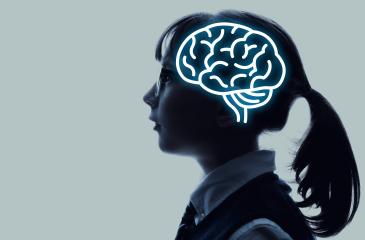MIDB Researchers Receive Award to Develop a New Approach for Individualizing Treatment of Childhood Psychiatric Disorders
Steven Nelson, PhD, associate professor in the Department of Pediatrics and Imaging Core director at the Masonic Institute for the Developing Brain (MIDB), and Christine Conelea, PhD, assistant professor in the Department of Psychiatry & Behavioral Sciences and director of MIDB’s Neuromodulation Program, recently received a Masonic Cross-Departmental Grant in Children’s Health Research to study the use of a neuroimaging technique called precision functional mapping for transcranial magnetic stimulation (TMS) in children.
TMS—which has shown significant promise in treating psychiatric disorders in adults—targets locations in the brain, stimulating areas to directly improve functioning in the specific brain areas that contribute to symptoms. TMS also has limited side effects compared with other approaches that may not be well-tolerated.
“Mental illness affects 13 to 20 percent of children, but unfortunately current treatments for commonly occurring psychiatric disorders have limited efficacy,” said Conelea. “Of those that do show promise, we don’t yet have a method to determine which treatments will work best for which children. In an era that holds considerable promise for precision medicine approaches, we need to understand considerably more about the biological basis of mental illness and the ways in which it manifests in individual children as opposed to the ‘average child’.”
In this study, researchers will develop a new method for identifying specific brain locations to target with TMS in children with psychiatric disorders, including depression, obsessive compulsive disorder, and Tourette Syndrome. They will use a neuroimaging technique called precision mapping to locate TMS brain targets in individual children, paving the way for personalized TMS treatment. The goal is to explore different techniques for extracting this information from neuroimaging of the brain using magnetic resonance imaging (MRI) and to establish the degree to which longer or multiple imaging sessions can be tolerated by children with mental illness.
“The answers to these questions will form the building blocks upon which we can then begin to interrogate the optimal approach for collecting precision neuroimaging data and use it in combination with TMS to target individual-specific brain regions, making TMS a more effective treatment for childhood psychiatric disorders,” said Nelson.
Funded through the University of Minnesota Department of Pediatrics, the Masonic Cross-Departmental Grants in Children’s Health Research support interdisciplinary research in children’s health that is innovative and has a high potential for future funding and discovery.



